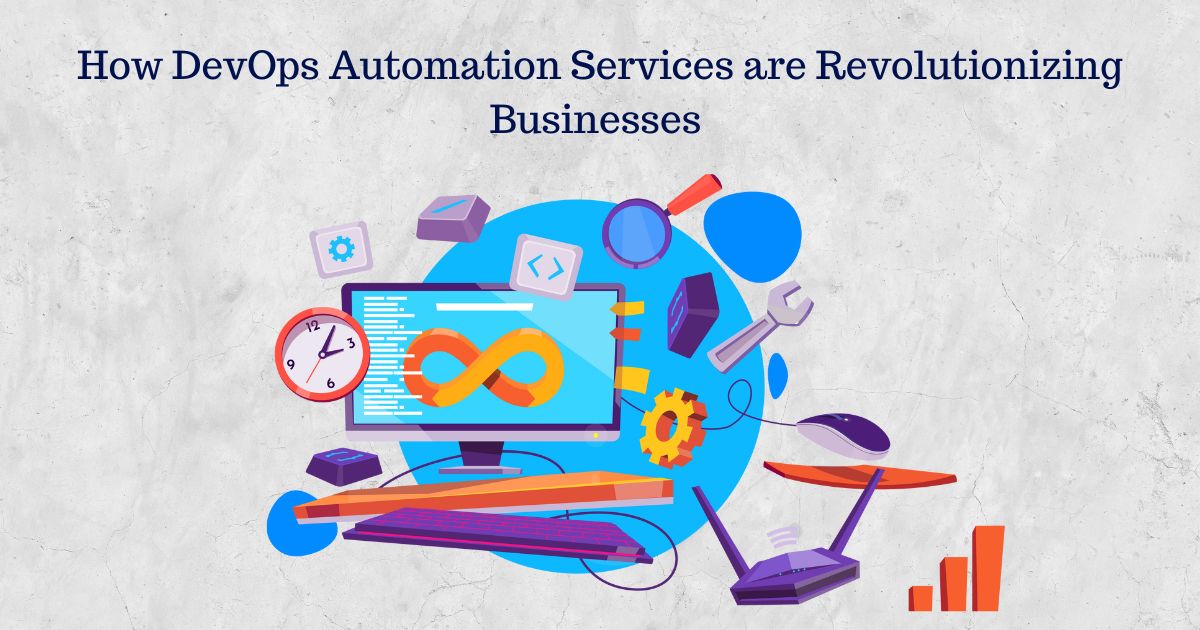
Enterprises in the ever-changing 21st century endeavor to maintain a competitive edge through the assimilation of inventive technology and approaches. To improve the effectiveness and speed of software development and delivery, one such revolutionary strategy is DevOps, which integrates development (Dev) and operations (Ops). By providing previously unheard-of benefits in terms of productivity, scalability, and creativity, DevOps automation services will be important in transforming enterprises in 2024. This article explores the advantages, implementation techniques, and future prospects of DevOps automation services, highlighting their significant impact on contemporary organizations.
Understanding DevOps Automation
What is DevOps?
DevOps is a set of practices that integrates software development and IT operations to shorten the development lifecycle and deliver high-quality software continuously. It emphasizes collaboration, communication, and integration between development teams and IT operations, fostering a culture of shared responsibility and continuous improvement.
The Role of Automation in DevOps
Automation is a core component of DevOps, enabling the seamless integration of various processes, tools, and teams. DevOps automation encompasses the use of technology to perform tasks with minimal human intervention, enhancing the speed, accuracy, and consistency of software delivery. It includes automation of:
-
Infrastructure Provisioning: Automating the setup and management of IT infrastructure.
-
Continuous Integration/Continuous Deployment (CI/CD): Automating the build, testing, and deployment of applications.
-
Monitoring and Logging: Automating the monitoring of applications and infrastructure to detect and resolve issues promptly.
-
Configuration Management: Automating the management of software configurations and environments.
The Benefits of DevOps Automation Services
Enhanced Speed and Efficiency
One of the most significant advantages of DevOps automation services is the dramatic improvement in speed and efficiency. Automated processes reduce the time required for repetitive tasks, allowing development teams to focus on innovation and higher-value activities.
-
Faster Time-to-Market: Automation accelerates the development and deployment of software, enabling businesses to bring products and features to market more quickly.
-
Improved Resource Utilization: By automating routine tasks, organizations can optimize resource allocation, ensuring that human expertise is directed towards strategic initiatives.
Consistency and Reliability
Automation ensures that processes are executed consistently and accurately, minimizing the risk of human error and enhancing the reliability of software delivery.
-
Consistent Deployment: Automated deployment pipelines ensure that applications are deployed consistently across different environments, reducing discrepancies and deployment failures.
-
Reliable Testing: Automated testing frameworks provide consistent and thorough testing, ensuring that code changes are rigorously validated before deployment.
Scalability and Flexibility
DevOps automation services enable businesses to scale their operations seamlessly, adapting to changing demands and market conditions.
-
Elastic Infrastructure: Automated infrastructure provisioning allows organizations to scale resources up or down based on demand, ensuring optimal performance and cost-efficiency.
-
Flexible Deployment: Automation facilitates the deployment of applications across diverse environments, including on-premises, cloud, and hybrid setups.
Enhanced Collaboration and Communication
DevOps fosters a culture of collaboration and communication, breaking down silos between development and operations teams.
-
Shared Responsibility: Automation encourages a shared responsibility model, where both development and operations teams collaborate to achieve common goals.
-
Improved Communication: Automated tools and workflows enhance communication and transparency, ensuring that all stakeholders are aligned and informed.
Cost Savings
Automation reduces operational costs by minimizing manual intervention and optimizing resource utilization.
-
Reduced Labor Costs: Automation reduces the need for manual intervention, lowering labor costs associated with repetitive tasks.
-
Optimized Resource Usage: Automated scaling and resource allocation ensure that businesses only pay for the resources they use, reducing wastage and cost.
Implementing DevOps Automation Services
Assessing Business Needs and Objectives
Before implementing DevOps automation services, it is crucial to assess the specific needs and objectives of the business. This involves understanding the current challenges, defining the desired outcomes, and identifying the areas where automation can deliver the most significant benefits.
Choosing the Right Tools and Technologies
Selecting the appropriate tools and technologies is essential for successful DevOps automation. Some key considerations include:
-
Compatibility: Ensure that the chosen tools are compatible with existing systems and workflows.
-
Scalability: Opt for tools that can scale with the business as it grows.
-
Ease of Use: Choose tools that are user-friendly and require minimal training for adoption.
Popular DevOps automation tools include:
-
Jenkins: An open-source automation server for CI/CD.
-
Terraform: An infrastructure as code (IaC) tool for automating infrastructure provisioning.
-
Ansible: A configuration management tool for automating application deployment and configuration.
-
Prometheus: A monitoring tool for collecting and analyzing metrics.
Building a Culture of Collaboration
Successful DevOps implementation requires a cultural shift towards collaboration and shared responsibility. This involves:
-
Encouraging Cross-Functional Teams: Promote the formation of cross-functional teams that include members from development, operations, and quality assurance.
-
Fostering Open Communication: Create an environment where open communication and feedback are encouraged and valued.
-
Providing Training and Support: Invest in training and support to ensure that all team members are equipped with the necessary skills and knowledge.
Implementing CI/CD Pipelines
Continuous Integration and Continuous Deployment (CI/CD) pipelines are critical components of DevOps automation. Implementing CI/CD pipelines involves:
-
Automating Code Integration: Automate the process of integrating code changes into a shared repository, ensuring that code is continuously tested and validated.
-
Automating Deployment: Automate the deployment of applications to different environments, ensuring that new features and updates are delivered rapidly and reliably.
-
Implementing Rollback Mechanisms: Include automated rollback mechanisms to revert to previous versions in case of deployment failures.
Monitoring and Feedback Loops
Continuous monitoring and feedback loops are essential for maintaining the health and performance of applications and infrastructure. This involves:
-
Automating Monitoring: Implement automated monitoring tools to continuously track the performance and health of applications and infrastructure.
-
Setting Up Alerts: Configure alerts to notify teams of potential issues or anomalies, enabling proactive resolution.
-
Analyzing Metrics: Regularly analyze metrics and feedback to identify areas for improvement and optimization.
The Future of DevOps Automation
AI and Machine Learning Integration
The integration of AI and machine learning with DevOps automation is set to revolutionize the way businesses operate. AI and ML can enhance automation by:
-
Predictive Analytics: Using machine learning algorithms to predict potential issues and recommend proactive measures.
-
Intelligent Automation: Implementing AI-driven automation for tasks such as anomaly detection, performance optimization, and resource allocation.
-
Automated Decision-Making: Enabling automated decision-making processes based on real-time data and analytics.
Serverless Computing
Serverless computing is an emerging trend that eliminates the need for managing server infrastructure, allowing businesses to focus on developing and deploying applications. Serverless computing offers:
-
Scalability: Automatically scales based on demand, ensuring optimal performance without manual intervention.
-
Cost Efficiency: Businesses only pay for the resources they use, reducing infrastructure costs.
-
Simplified Management: Eliminates the need for server management, allowing teams to focus on application development and innovation.
Edge Computing
Edge computing is transforming the way data is processed and analyzed by bringing computation closer to the data source. This has significant implications for DevOps automation:
-
Reduced Latency: Edge computing reduces latency by processing data closer to the source, improving application performance.
-
Enhanced Security: By processing data locally, edge computing enhances security and compliance.
-
Scalability and Flexibility: Edge computing enables scalable and flexible deployment of applications, particularly in distributed environments.
DevSecOps
DevSecOps is an extension of DevOps that integrates security practices into the DevOps workflow. It emphasizes the need for security to be a shared responsibility and ensures that security is integrated throughout the software development lifecycle.
-
Automated Security Testing: Implement automated security testing as part of the CI/CD pipeline to detect and remediate vulnerabilities early.
-
Continuous Monitoring: Continuously monitor applications and infrastructure for security threats and anomalies.
-
Collaboration and Training: Foster collaboration between development, operations, and security teams, and provide training on security best practices.
Conclusion
DevOps automation services are revolutionizing businesses in 2024, offering transformative benefits in terms of speed, efficiency, scalability, and innovation. By integrating development and operations, automating processes, and fostering a culture of collaboration, businesses can achieve unprecedented levels of productivity and competitiveness. As emerging technologies such as AI, serverless computing, edge computing, and DevSecOps continue to evolve, the future of DevOps automation holds immense potential for further innovation and growth. Embracing DevOps automation is not just a technological shift; it is a strategic imperative for businesses seeking to thrive in the rapidly changing digital landscape.



